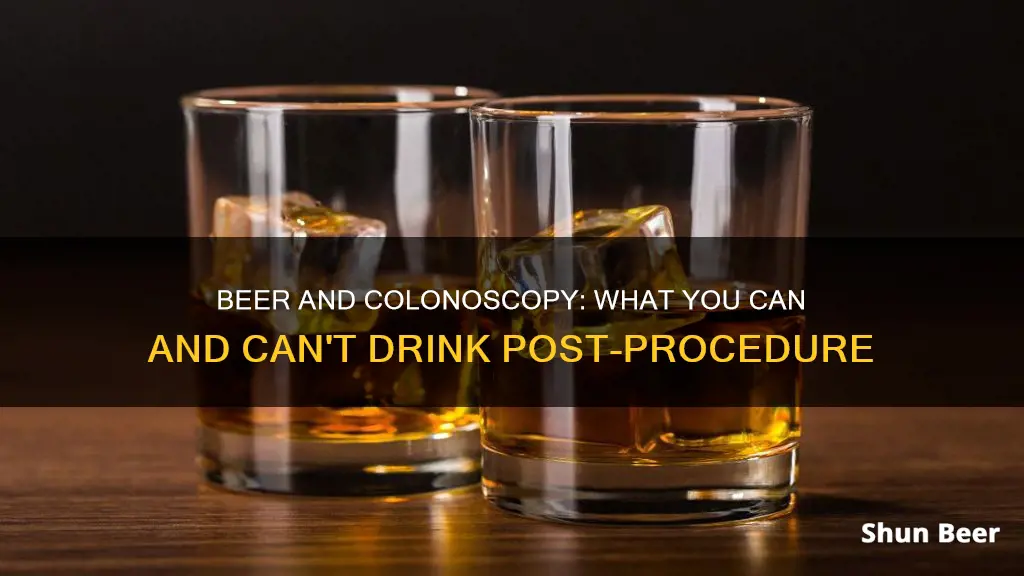
It is not advisable to drink beer or any other alcoholic beverage after a colonoscopy. The procedure can leave your digestive tract sensitive, and alcohol can irritate or inflame the delicate tissues and stomach lining. Additionally, the medications given during the procedure can remain in the system for up to 24 hours, and alcohol can disrupt how the body absorbs these chemicals, affecting recovery time. It is recommended to wait at least eight hours after the procedure before consuming alcohol, and some sources suggest waiting a full 24 hours.
| Characteristics | Values |
|---|---|
| Drinking beer after a colonoscopy | Not recommended |
| Reasoning | Alcohol can irritate or inflame the delicate tissues and stomach lining in the digestive tract |
| Alternative drinks | Water, fruit and herbal teas, and juices |
| Time to wait before drinking alcohol | At least 8 hours, or 24 hours according to some sources |
What You'll Learn
- Alcohol can irritate the sensitive digestive tract after a colonoscopy
- Dehydration is a concern after a colonoscopy, and alcohol can make this worse
- Alcohol affects how the body absorbs anaesthetic and prescription painkillers
- Alcohol can remain in the body for a few days, so it's best avoided before and after a colonoscopy
- Even alcohol-free beer contains small amounts of alcohol and should be avoided

Alcohol can irritate the sensitive digestive tract after a colonoscopy
After a colonoscopy, it's important to give your body time to recover, and that includes being mindful of what you eat and drink. Alcohol is a big no-no, and there are several reasons why you should avoid it in the days following the procedure.
Firstly, a colonoscopy involves inserting a thin, flexible tube with a camera into the patient's rectum, allowing doctors to examine the large intestine and rectum. This procedure can leave the digestive tract sensitive and delicate, and alcohol can irritate or inflame the tissues and stomach lining. It's best to give your body time to heal and fully recover before considering consuming alcohol.
The digestive tract, which includes the stomach and intestines, is responsible for converting food and drink into energy and waste. After a colonoscopy, this system may be more delicate and vulnerable to irritation. Alcohol is known to cause inflammation and can disrupt the healing process, potentially leading to discomfort and prolonged recovery.
Additionally, the preparation for a colonoscopy involves stopping eating and drinking and taking laxatives to ensure a clear view for the examination. These steps can lead to dehydration, and consuming alcohol when dehydrated is never advisable. Alcohol can further deplete fluids and electrolytes, exacerbating dehydration and potentially leading to serious health complications.
Furthermore, during the colonoscopy, patients may be given anaesthesia or sedatives to minimise discomfort. Alcohol can interfere with the absorption of these medications, affecting recovery. It is recommended to wait at least 24 hours after the procedure, or until the effects of anaesthesia have completely worn off, before considering alcohol consumption.
Lastly, it's worth noting that everyone's recovery process is unique, and it's always best to consult your doctor for personalised advice. They will provide specific guidelines and recommendations based on your procedure and overall health. In general, it's advisable to wait at least eight hours after the procedure before consuming any alcohol, and even then, opting for clear liquids and light, easily digestible foods is recommended to aid recovery.
Beer and Medication: A Safe Combination?
You may want to see also

Dehydration is a concern after a colonoscopy, and alcohol can make this worse
Dehydration is a common concern after a colonoscopy, and alcohol can make this worse. In the days and hours before a colonoscopy, patients are advised to stop eating and drinking and to take a laxative. These steps, known as 'bowel prep', give the doctor a clear view of the patient's internal health during the procedure. However, they can also lead to dehydration. Since dehydration and alcohol are a dangerous mix, it's best to avoid drinking beer or other alcoholic beverages immediately after a colonoscopy.
The procedure itself can also contribute to dehydration. During a colonoscopy, patients are often given medication to relax and minimise discomfort. These medications can remain in the system for at least eight hours after the procedure, and it's important to allow them to wear off before consuming alcohol. Additionally, the invasive nature of the procedure can leave patients feeling exhausted and in need of rest, which alcohol can interfere with.
The digestive tract is particularly sensitive after a colonoscopy, and alcohol can irritate or inflame the delicate tissues and stomach lining. It's recommended to wait at least eight hours after the procedure, or even 24 hours if possible, to allow the digestive tract to recover. Alcohol can also disrupt the absorption of any prescription painkillers taken after the procedure, affecting recovery time and potentially causing serious health problems.
To aid in recovery, it's important to focus on rehydration and light, easily digestible foods. Doctors typically advise sticking to clear liquids for a few days, such as water, fruit and herbal teas, and juices. Staying hydrated is crucial, as the body needs time to recover from the dehydration caused by the bowel prep and the procedure itself.
Beer and Typhoid: A Dangerous Mix?
You may want to see also

Alcohol affects how the body absorbs anaesthetic and prescription painkillers
After a colonoscopy, it is strongly recommended that you refrain from drinking alcohol. This is primarily because the procedure can cause your digestive tract to become more sensitive. Alcohol can irritate or inflame the delicate tissues and stomach lining in your digestive tract, hindering your recovery. Additionally, the bowel preparation before the procedure can lead to dehydration, and consuming alcohol while dehydrated is dangerous.
One of the main reasons to avoid alcohol after a colonoscopy is its interaction with anaesthesia and prescription painkillers. Anaesthesia is often administered during a colonoscopy, and patients may be prescribed painkillers to manage discomfort after the procedure. Alcohol consumption can disrupt how the body absorbs these chemicals, affecting your recovery process and time. This is because alcohol is a drug that passes quickly into your bloodstream and is distributed throughout your body, including vital organs such as the brain, kidneys, lungs, and liver.
Anaesthetic drugs can remain in your system for up to 24 hours after a procedure. Alcohol consumption during this period can interfere with the absorption and metabolism of the anaesthetic agents, leading to serious health risks. Alcohol can enhance the effects of sedatives, which are among the most potent drugs, and an excess of these drugs in the system can be fatal. Therefore, it is crucial to wait at least a day or two before consuming alcohol to ensure the safe elimination of anaesthetic agents from your body.
Similarly, prescription painkillers, when combined with alcohol, can lead to dangerous interactions. Alcohol can affect the absorption and metabolism of painkillers, altering their effectiveness and increasing the risk of side effects. Mixing alcohol with painkillers can enhance the sedative effects of both substances, leading to dangerous levels of impairment and increasing the risk of accidental overdose. Therefore, it is essential to refrain from alcohol consumption while taking prescription painkillers to ensure your safety and well-being.
In conclusion, alcohol consumption after a colonoscopy can negatively impact your recovery process. This is mainly due to its interaction with anaesthetic agents and prescription painkillers, which are often used during and after the procedure. By disrupting the absorption and metabolism of these substances, alcohol can lead to serious health complications. Therefore, it is crucial to follow medical advice and refrain from alcohol consumption for at least 24 hours or as directed by your physician to ensure a safe and smooth recovery.
Old Beer: Poisonous or Perfectly Safe to Drink?
You may want to see also

Alcohol can remain in the body for a few days, so it's best avoided before and after a colonoscopy
It is best to avoid drinking beer or any other alcoholic beverage for at least 24 hours after a colonoscopy. This is because the procedure can leave your digestive tract more delicate than usual, and alcohol can irritate or inflame the sensitive tissues and stomach lining in your digestive tract. Additionally, you may be given anaesthesia or prescription painkillers after the procedure, and alcohol can affect how the body absorbs these chemicals, potentially impacting your recovery time and process.
Anaesthetic drugs can remain in your system for up to 24 hours after a colonoscopy, and alcohol can linger in your body for a few days. Therefore, it is recommended that you avoid drinking alcohol for at least two days before and at least one day after the procedure. This will give your digestive tract time to recover and ensure that any anaesthetic drugs have left your system.
It is important to follow the advice of your doctor when it comes to consuming alcohol after a colonoscopy. They will be able to provide specific guidelines based on your individual case and the details of the procedure. In general, it is recommended that you wait at least eight hours after the procedure before consuming any alcohol.
During your recovery, it is important to focus on rehydration and consuming light, easily digestible foods and drinks. Water, fruit and herbal teas, and juices are good options to help you stay hydrated, while foods like soup, toast, crackers, vegetables, and eggs can aid in your recovery. It is also important to get plenty of rest in the first 24 hours after the procedure.
Vegans and Beer: What's the Verdict?
You may want to see also

Even alcohol-free beer contains small amounts of alcohol and should be avoided
It is important to avoid drinking alcohol after a colonoscopy. The procedure can leave your digestive tract in a sensitive state, and alcohol can irritate or inflame the delicate tissues and stomach lining. This can disrupt and delay the recovery process.
Even if you feel physically able to drink, alcohol can remain in your system for some time after consumption. This can be dangerous if you are still under the influence of anaesthesia or prescription painkillers, as alcohol affects how the body absorbs these chemicals. Mixing alcohol with sedatives can be extremely risky and even fatal.
Anaesthetic drugs can remain in the body for up to 24 hours after a procedure, so it is generally recommended to wait at least a full day before consuming alcohol. It is also important to note that alcohol can linger in the body for several days, so it is advised to avoid drinking alcohol for at least two days before a colonoscopy or similar procedure.
It is always best to consult your doctor for specific advice regarding alcohol consumption after a colonoscopy, as they will be able to provide guidance tailored to your individual circumstances.
Beer and Piles: A Risky Combination?
You may want to see also
Frequently asked questions
It is not recommended to drink beer or any other alcoholic beverage after a colonoscopy. Alcohol can irritate or inflame the delicate tissues and stomach lining in your digestive tract. It is best to wait at least 8 hours, or even 24 hours, after the procedure before consuming alcohol.
The medications given during a colonoscopy can remain in the system for at least 8 hours, and the digestive tract is likely to be more sensitive after the procedure. Alcohol can disrupt the absorption of these medications and affect recovery time.
It is important to rehydrate after a colonoscopy, so clear liquids are recommended. Water, fruit and herbal teas, and juices are good options.
It is generally recommended to wait at least 8 hours after the procedure, and some sources suggest waiting up to 24 hours. It is best to consult your doctor for specific advice, as it may depend on your individual circumstances.







